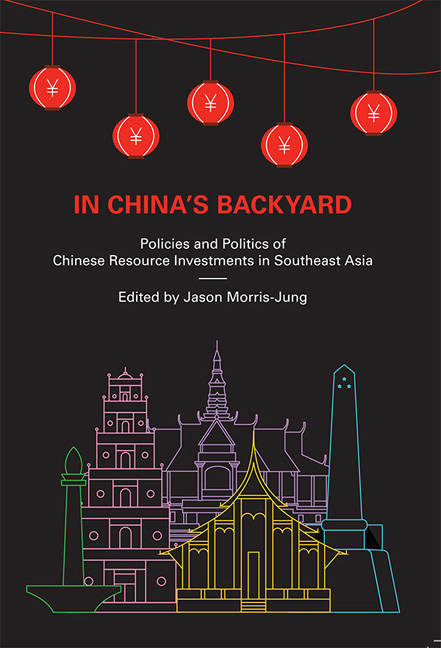Book contents
- Frontmatter
- Contents
- Foreword
- Acknowledgements
- About the Contributors
- 1 Introduction
- 2 Mixed Motivations, Mixed Blessings: Strategies and Motivations for Chinese Energy and Mineral Investments in Southeast Asia
- 3 Mineral Resources in China's “Periphery” Diplomacy
- 4 Energy Entanglement: New Directions for the China–Indonesia Coal Relationship
- 5 Indonesia–China Energy and Mineral Ties: The Rise and Fall of Resource Nationalism?
- 6 The Direction, Patterns, and Practices of Chinese Investments in Philippine Mining
- 7 Development Cooperation with Chinese Characteristics: Opium Replacement and Chinese Rubber Investments in Northern Laos
- 8 The High Cost of Effective Sovereignty: Chinese Resource Access in Cambodia
- 9 Complex Contestation of Chinese Energy and Resource Investments in Myanmar
- 10 Anti-Chinese Protest in Vietnam: Complex Conjunctures of Resource Governance, Geopolitics and State–Society Deadlock
- 11 Complexities of Chinese Involvement in Mining in the Philippines
- 12 Conclusion
- Bibliography
- Index
7 - Development Cooperation with Chinese Characteristics: Opium Replacement and Chinese Rubber Investments in Northern Laos
Published online by Cambridge University Press: 04 July 2018
- Frontmatter
- Contents
- Foreword
- Acknowledgements
- About the Contributors
- 1 Introduction
- 2 Mixed Motivations, Mixed Blessings: Strategies and Motivations for Chinese Energy and Mineral Investments in Southeast Asia
- 3 Mineral Resources in China's “Periphery” Diplomacy
- 4 Energy Entanglement: New Directions for the China–Indonesia Coal Relationship
- 5 Indonesia–China Energy and Mineral Ties: The Rise and Fall of Resource Nationalism?
- 6 The Direction, Patterns, and Practices of Chinese Investments in Philippine Mining
- 7 Development Cooperation with Chinese Characteristics: Opium Replacement and Chinese Rubber Investments in Northern Laos
- 8 The High Cost of Effective Sovereignty: Chinese Resource Access in Cambodia
- 9 Complex Contestation of Chinese Energy and Resource Investments in Myanmar
- 10 Anti-Chinese Protest in Vietnam: Complex Conjunctures of Resource Governance, Geopolitics and State–Society Deadlock
- 11 Complexities of Chinese Involvement in Mining in the Philippines
- 12 Conclusion
- Bibliography
- Index
Summary
As China's role in the global economy has grown, it has become increasinglyinvolved in developing economies through aid and overseas developmentassistance. China promotes a range of projects under the umbrella of“development cooperation” and has, on occasion, proclaimed an alternativedevelopment model to that of its Western counterparts. Such statements drawattention to how development operates as both a rhetoric and a practice forchannelling foreign investment abroad. This chapter examines how narrativesof a “Chinese model” has shaped the rationalization and practices ofChinese rubber companies in Laos through the Opium Replacement Program(ORP). The ORP is a Chinese state project active since 2004, which aims toeradicate opium cultivation by providing alternative agricultural livelihoods.This project catalyzed an influx of Chinese capital into northern Laos that hasdrastically transformed local agricultural systems, livelihoods and land uses.The ORP is an important case for analysing the challenges and contradictionsthat arise when Chinese concepts and China's unique historical experience ofdevelopment are transplanted into other contexts.
Introduction
In the late 1990s, the global price for natural rubber soared and Xishuangbanna — a major rubber producing area in remote southwest China — grew rich. Across the border in northern Laos, farmers and state officials looked on in envy at this miracle cash crop. Some began experimenting with it. When the Chinese government established the Opium Replacement Program (ORP) in 2004, it was welcomed in Laos as further support for the growing rubber sector. As a result, Lao rubber cultivation expanded significantly. The ORP was established to incentivize large-scale agribusiness projects to provide alternative livelihoods schemes as substitutes for opium cultivation in Laos and Myanmar. Chinese companies rushed to take advantage of the ORP and its financial supports. Though a range of cash crops were allowed, the vast majority of ORP funding went to establishing rubber plantations. Amid the initial rush, Chinese investors, Lao farmers and Lao state officials recounted stories of rubber's success in Xishuangbanna as justification. Rubber was a silver bullet that contributed to development, poverty alleviation, and modernization. But in 2011, as global rubber prices plummeted, dreams of new motorbikes, paved roads, corporate profits and hefty government revenues were suddenly dashed.
The drop in rubber prices also dashed claims that China's development success was wholly replicable in other contexts.
- Type
- Chapter
- Information
- In China's BackyardPolicies and Politics of Chinese Resource Investments in Southeast Asia, pp. 154 - 181Publisher: ISEAS–Yusof Ishak InstitutePrint publication year: 2017

